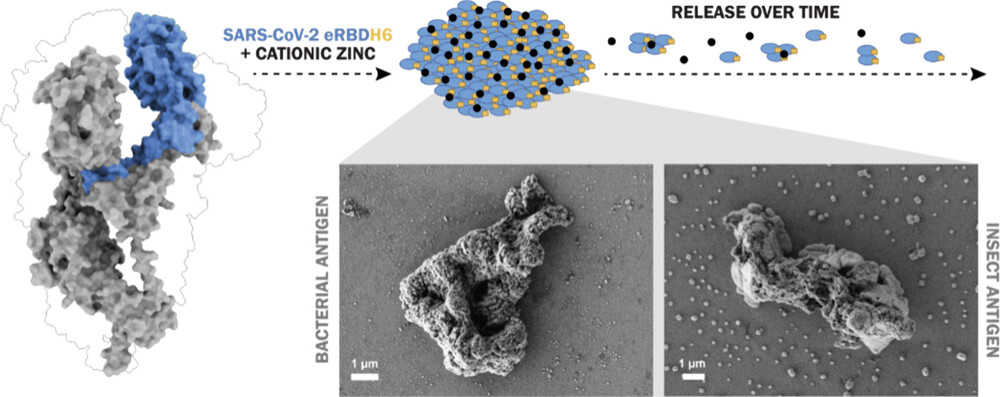
This novel immunization platform, recently published in ACS, triggers potent antivirus response, promising efficient and cost-effective vaccination.
March 2024, UAB/Vall d’Hebron Research Institute/CIBER-BBN (Barcelona)
The battle against infectious diseases demands innovative solutions. The world is especially aware of this fact after facing threats such as the SARS-CoV-2 pandemic. In a very recent publication in ACS Materials Letters, researchers from the Universitat Autònoma de Barcelona (UAB) and Hospital de Sant Pau, both within the CIBER-BBN, have achieved a significant milestone in vaccine development. Their study, conducted in partnership with international teams as well as NANBIOSIS, has introduced a novel immunization approach utilizing synthetic protein secretory granules.
These protein materials, developed by the team and highlighted in the study, exhibit endocrine-like functionalities tailored for the sustained release of protein drugs in oncology. At the microscale, these self-organized, self-contained protein granules undergo a spontaneous disintegration process associated with secretion, releasing their protein building blocks under physiological conditions. This technology, developed in collaboration with NANBIOSIS units, particularly the Protein Production Platform (Unit 1) and Nanotoxicology (Unit 18), holds promise beyond oncology, extending to various biomedical applications.
A promising solution to address not only existing infectious diseases but also future emerging threats.
The ACS publication:
In their work published last February 2024 [1], the researchers explored the potential of these synthetic protein secretory granules as an antigen delivery system for SARS-CoV-2. Thus, by utilizing a recombinant form of the virus’s receptor-binding domain, they investigated its efficacy in inducing neutralizing antibody responses in mice. Notably, the granules were administered without adjuvants, demonstrating their ability to trigger potent antivirus neutralizing responses.

The implications of this study are profound. Beyond the immediate context of COVID-19, this innovative immunization platform opens doors to more efficient vaccine delivery methods. By reducing dosage, costs, and the complexity of vaccination regimens, it presents a promising solution to address not only existing infectious diseases but also future emerging threats.
The collaborative nature of this research underscores the importance of synergistic partnerships. Alongside local institutions such as CIBER-BBN, ICREA, Institut de Recerca from Hospital Vall d’Hebró, and Hospital de Sant Pau, international collaboration with the University of São Paulo in Brazil has enriched the study’s scope and insights.
Funding for this groundbreaking research was provided by AGAUR through project 2020PANDE00003, and by CIBER-BBN through Intramural Projects NANOSARS and NANOREMOTE. Such support highlights the societal and scientific significance of this endeavor, emphasizing its potential to shape the future of vaccination strategies.
This publication marks a significant step forward in the fight against infectious diseases, showcasing the power of interdisciplinary collaboration and driving us towards a safer, healthier future. One in which NANBIOSIS will certainly contribute with the undisputable expertise of its researchers.
References:
[1] Zinc-Assisted Microscale Granules Made of the SARS-CoV-2 Spike Protein Trigger Neutralizing, Antivirus Antibody Responses. Marianna T. P. Favaro, Patricia Alamo, Nerea Roher, Miguel Chillon, Jara Lascorz, Merce Márquez, José Luis Corchero, Rosa Mendoza, Carlos Martínez-Torró, Neus Ferrer-Miralles, Luis C. S. Ferreira, Ramón Mangues, Esther Vázquez, Eloi Parladé, and Antonio Villaverde. ACS Materials Lett. 2024, 6, 3, 954–962. February 14, 2024 https://doi.org/10.1021/acsmaterialslett.3c01643About NANBIOSIS:
The goal of NANBIOSIS is to provide comprehensive and integrated advanced solutions for companies and research institutions in biomedical applications. All of this is done through a single-entry point, involving the design and production of biomaterials, nanomaterials, and their nanoconjugates. This includes their characterization from physical-chemical, functional, toxicological, and biological perspectives (preclinical validation).
In order to access our Cutting-Edge Biomedical Solutions, place your request here.
NANBIOSIS has worked with pharmaceutical companies of all sizes in the areas of drug delivery, biomaterials and regenerative medicine. Here are a few of them:









